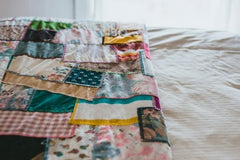IS UPCYCLING SUSTAINABLE?

What is Upcycling?
A dictionary definition of 'Upcycling' is: "to process (used goods or waste material) so as to produce something that is often better than the original."[1.]
Other dictionary definitions include the terms of creating something new with higher value than its original piece. Recently, the term 'upcycling' has been a trending craft, seen in many television shows as a way to be 'sustainable'.
Quite often, I see products that claim to have been upcycled. However, these products weren't exactly waste in the first instance. Many people purchase secondhand clothing then cut them up to use the portion they want for their new upcycled piece. However, not only are you then left with the remaining portion as waste, you have also actually created waste, as this original piece could have been worn as is prior.
Upcycling is only sustainable when it is produced by actual waste. So for example, if you have a t-shirt that is so worn out that it cannot be worn again, then yes, you can shred up that t-shirt as you wish to use it for your new piece.
This is a great way of being more sustainable, as upcycling means the product does not have to undergo rigorous recycling processes, using up other resources. It can also be a great way to use up fabrics that cannot be recycled.
Upcycling from waste products, particularly those from by-products, is a great way of reducing landfill, and in some cases, providing jobs and value in localised areas.
Where we can reduce our waste by upcycling, we must also be mindful to not save absolutely everything we own for potential upcycling, otherwise we could end up living with lots of junk, and hoarding products we may never even use again. Remember, one man's waste is another man's treasure!
What do you upcycle?
--------
Sources:
1. https://www.dictionary.com/browse/upcycle
